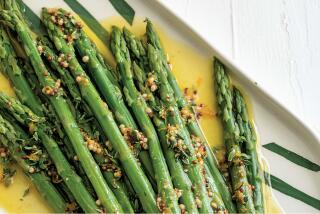BODY WATCH : Crunch Appeal : Hold the Pudding and Porridge, and Pass the Potato Chips and Popcorn
- Share via
When Chicago dietitian Alicia Moag-Stahlberg is under stress and hungry, she’ll usually snack sensibly on low-fat popcorn or pretzels. But sometimes nothing will do but extra crunchy shoestring potatoes--even though they pack a wallop of fat and salt.
“It’s not just a regular potato chip,” she explains. “These shoestring potatoes crunch more.”
And therein lies the appeal for Moag-Stahlberg and millions of other noisy noshers: They’re hooked on crunch appeal.
While there’s not a lot of science behind why we crave crunchy foods, there are several reasonable theories.
Crunchy foods can ease tensions after a long day, says Elizabeth Ward, a staff dietitian for the Harvard Community Health Plan, Boston, and a spokeswoman for the American Dietetic Assn.
“Think about what it feels like to chew something very crunchy,” she suggests. “Compare an apple to applesauce. The apple takes so much more work to grind it with your teeth that you are using those muscles in your face that you may tense up during the day.”
Tense people can also feel the effects of stress in their neck and shoulder areas, she adds, and eating something crunchy might help relax those muscles.
Ward adopted the tension-reducing theory after her sister-in-law explained her fondness for rice cakes by saying, “It just tastes so good to chew.”
Although crunchy foods aren’t meant as a substitute for stress-reduction classes or an hour with a good therapist, Dr. Mark Goulston says the tension-reducing theory makes sense.
“When the world bites you, you want to bite back,” says the Santa Monica psychiatrist.
While there is scientific literature on cravings, “there is not a lot of science about why one craves crunchy foods and another craves smoother foods,” Moag-Stahlberg says. “But we eat for a lot of reasons. Hunger is one of the lower ones (on the list). Sensory satisfaction is way up high, and part of that is not only taste but texture. People like in-your-face eating experiences.”
Crunchiness can also enhance the sensory experience of eating, according to food chemists, who, of course, don’t call it crunch.
“Food chemists talk about fractureability,” explains Susan Brewer, an associate professor of foods and nutrition at the University of Illinois, Urbana.
“Think of hard candy. When you put it between your back teeth and bear down, it fractures and falls away from the pressure rather than compressing or smashing or sticking to your teeth. Normally, that (fractureability) is one of the main aspects of crunchiness--the ability to fracture off cleanly, as opposed to sticking to the teeth.”
And let’s not overlook the auditory dimension of The Crunch. (“For some eaters, sound is very important,” Brewer says.)
Or its place as a diet aid.
“Good crunchy foods, in general, are high in fiber and are filling,” Ward says. “They take longer to chew than other foods. You feel like you’ve really eaten something.”
But it might not be a good idea for dieters to rely only on fat-free crunchy foods, particularly because part of the appeal of crunchy foods might be the fat and salt.
Moag-Stahlberg suggests indulging in small portions of crunchy foods with fat and salt, satisfying the crunch/salt/fat urge in one fell swoop. Better to have a few crackers with salt and fat and feel full than to have a half-gallon of air-popped corn and still feel deprived.
Crunchy foods could also be a boon for dental health, although those with jaw problems are wise to avoid them.
“There are certain crunchy foods that act as detergents on the teeth--your natural plaque removers, like fresh fruits and vegetables,” says Linda Niessen, professor of dentistry at Baylor College of Dentistry, Dallas. But crunchy refined foods--because of added ingredients such as sugars and complex starches--could promote tooth decay.
Crunching ice is discouraged, Niessen says, because “it can cause microscopic cracks in the enamel, which can weaken the tooth.” Biting down too forcefully on peanut brittle, hard candy or other hard foods can harm the teeth, too.
If crunch adds variety and pleasure, go for it, nutritionists advise.
Says Ward: “Because we get hung up on nutrients, we tend to overlook that eating is also a psychological experience. And it has to be satisfying on so many levels for people to feel nourished.”


